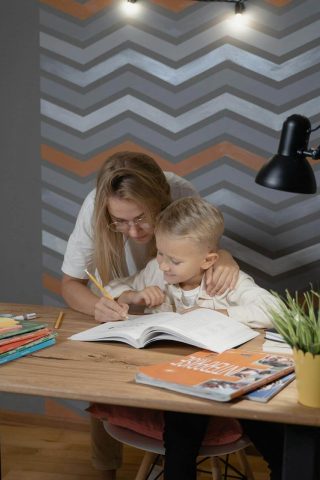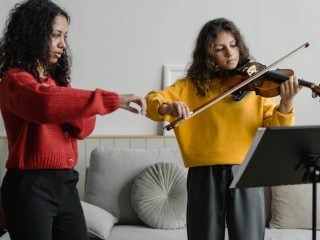Learning music at school and at home
Health and Wellbeing Support for Parents
Taking care of your mental health and checking in on others is something we can all do, and we need to remember that by looking after our own mental health, we’ll be best placed to look after our children.

Time is precious, especially when looking after children
Looking After Yourself
Social media can be great for some people, but if you can, try to make phone calls or better, video calls. Arrange to FaceTime or WhatsApp a friend or family member. Whilst it can be helpful to share worries, try to find other things to talk about too.
Time is precious, especially when looking after children. However, try to plan your days or weeks to include something from each of the “5 ways to wellbeing,” developed by the New Economics Foundation.
Try to make sure that you and your family get regular exercise every day. YouTube has lots of exercise videos for kids and adults. Get children involved in planning their own indoor PE lesson.
Take a break from news and social media and concentrate on what's happening in the here and now in your family. Notice and appreciate the small things. Studies have shown that being aware of what is taking place in the present directly enhances your wellbeing.
Social connections are one of the most important ways that we can look after our mental wellbeing. Social istancing can make that trickier, but we have
technology to help us out. If you need to engage in physical distancing, maintain your social connections.
Research tells us that giving back to our community helps people feel valuable and makes us happier. Lots of community groups have schemes that aim to help vulnerable people. If you want to get involved, check out local news and media for ideas. Many are not in a position to offer practical support, yet can still offer mutual support to friends and family by checking in with them regularly.
Learning a new skill or honing an existing one gives us a sense of purpose and achievement. Whilst we're busy learning, we're less likely to experience anxious thoughts and worries.
Love, attention and opportunities to learn and play
Looking After Your Children
For the most part, children need what they have always needed; love, attention and opportunities to learn and play. If children are home for long periods because of social distancing or self-isolation, or for other reasons, the following tips might be helpful to keep them healthy and engaged.
Try and keep to a structure and routine that suits your family. Keep bedtime and morning routines to promote a sense of normality that children find reassuring. Encourage them to get up and dressed during the week to help maintain some difference between weekdays and weekends.
Keep boundaries firm and make it clear that you expect the same standards of behaviour as usual. Boundaries show that adults are still in control and taking care of them, which helps children to feel safe.
Make sure your children get some time to burn off energy every day - physically and mentally. A break from work helps everyone to reset and recharge. Younger children will enjoy more physical activities than older, yet it's still important even for teenagers.
Children should undertake some learning every day. Schools and independent websites provide a wealth of resources. Continuing with their learning helps promote a sense of normality and purpose as well as keeping them up to date for when they are back at school, heading to college, university, or joining the workforce.
Find opportunities for your children to interact with their friends face-to-face or remotely. For tweens and teens, contact with their peers is especially important. Technology provides lots of opportunities for children to connect, chat and game together.
Remember to balance screen time with other activities. Challenge children to learn new skills that don't involve screens, e.g. tying shoe laces, juggling, baking. Older children might want to set their own goals.
Give children the opportunity to have a say in what will be happening. They may have had a lot of their freedoms and choices removed for a while or they may feel powerless or angry and upset. Older children and teenagers will be more able to understand the risks in too much screen time, too little sleep, inactivity etc. They are more likely to "buy in" to new rules and routines if they feel that they have a say. Family meetings where children and adults problem-solve together can be helpful for this.

Health and Wellbeing Resources for Parents
Parenting can be both rewarding and challenging, and having resources can make all the difference.



